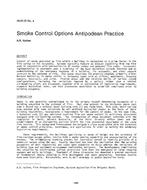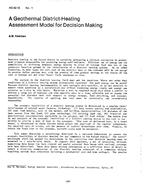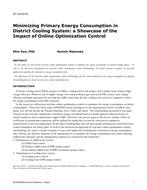Integration of dedicated outdoor air (OA) systems with parallel terminal systems represents a huge shift in the standard engineering design paradigm. This paper will present some of the issues that guided the migration path toward sepa-rate dedicated OA ventilation systems and away from delivering the ventilation via single all-air variable air volume systems. The paper will then attempt to show that once a shift in the design paradigm in favor of a separate dedicated OA ventilation system has occurred, questions concerning the thermodynamic state of the delivered ventilation arise. Some of the boundary conditions that impact the best state of the delivered ventilation air will be addressed. Specifically, the first variable of interest is supply air temperature and its impact on the size and, hence, the cost of the terminal equipment and the terminal reheat energy. The second specific variable is the dew-point temperature (DPT) and the resultant latent cooling capability of the delivered ventilation air and its impact on the types of terminal equipment that may be practical. If in the paradigm shift the supply air DPT is dropped low enough to remove all of the space latent loads, then sensible-only terminal equipment, such as radiant ceiling panels, may become viable choices in some situations and eliminate the production of microbial problems in the spaces. Finally, this line of reasoning is extended further to note that when the space dew points are controlled with the dedicated OA, the terminal sensible equipment may use uninsulated sprinkler piping as the energy transport conduit. Companion papers (Mumma and Shank 2001; Shank and Mumma 2001; Janus 2001; Conroy and Mumma 2001) will address specific issues related to the overall integration of these concepts into a sound working design.
Units: Dual
Citation: Symposium Papers, Atlanta, GA, 2001
Product Details
- Published:
- 2001
- Number of Pages:
- 8
- File Size:
- 1 file , 270 KB
- Product Code(s):
- D-7160


